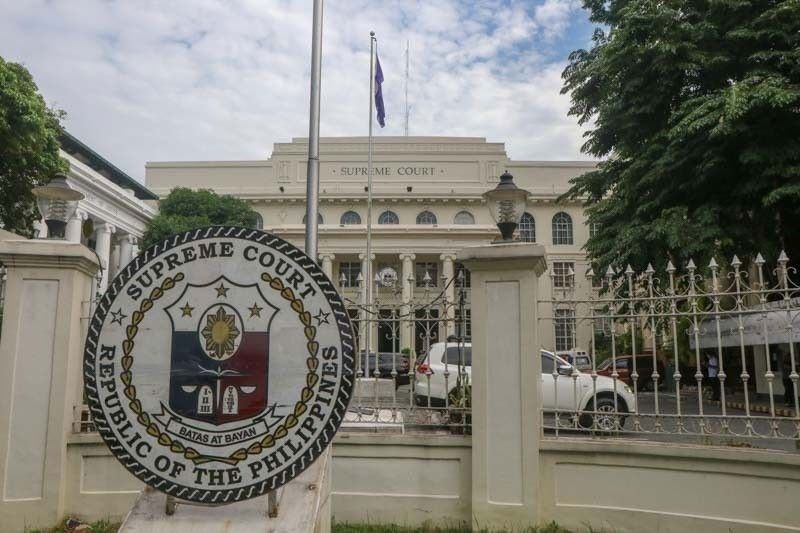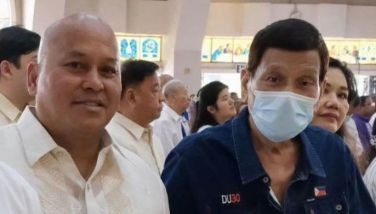Yearender: Supreme Court rulings make headlines in 2023

MANILA, Philippines — As 2023 came to a close, the Supreme Court (SC) saw an improvement in the number of cases it resolved, with the help of recent technological advancements.
In a briefing, Chief Justice Alexander Gesmundo revealed that the SC has resolved 3,711 cases as of Sept. 30 this year, accounting for a 21 percent disposition rate. This is up from the 19 percent rate recorded in 2022. He also touted a clearance rate of 84 percent.
Meanwhile, for administrative and en banc matters, the high tribunal has resolved 1,729 cases, accounting for a 29 percent disposition rate and an 88 percent clearance rate.
“Our performance has improved in terms of disposition compared to last year,” Gesmundo said. “We expect to further expedite the processing of cases, not only in the SC, but also in lower courts, once we started using the technology that we plan to implement next year.”
Joint exploration unconstitutional
In January, the SC declared the Tripartite Agreement for Joint Marine Seismic Undertaking among China, Vietnam and the Philippines – which was signed by the administration of then president Gloria Macapagal-Arroyo – as unconstitutional and void.
The joint venture by and among China National National Offshore Oil Corp., Vietnam Oil and Gas Corp. and the Philippine National Oil Co. covers 142,886 square meters in the South China Sea.
The Court voted 12-2-1, saying that the venture was unconstitutional “for allowing wholly-owned foreign corporations to participate in the exploration of the country’s natural resources without observing the safeguards” provided in Article XII, Section 2 of the 1987 Constitution.
Thumbs up for TRAIN law
Also in January, the SC upheld the constitutionality of the Tax Reform for Acceleration and Inclusion or TRAIN law as it dismissed the consolidated petitions against the measure that argued it was unconstitutionally passed by the House of Representatives given a lack of quorum and that its provisions imposing excise on petroleum products are “prohibited regressive taxes.”
Thirteen justices voted to dismiss the petitions against it. The SC held that the supposed absence of a quorum was refuted by the official journal of the House of Representatives, both on the day that the TRAIN’s Bicameral Conference Report was ratified and on the immediately subsequent session date of Jan. 15, 2018.
The SC also reiterated that the Constitution, in its present form, does not prohibit the imposition of regressive taxes, but merely directs Congress to evolve a progressive system of taxation.
Postponement of BSKE
In June, with only four months left until election day, the SC declared the law postponing the barangay and Sangguniang Kabataan elections (BSKE) as unconstitutional.
The SC issued the decision eight months after concluding the oral arguments and was left with no choice but to allow the polls to proceed due to “legal practicality and necessity.”
Veteran election lawyer Romulo Macalintal and six other lawyers earlier asked the high court to outlaw Republic Act 11935, which moved the BSKE to Oct. 30, 2023 from the original date of Dec. 5, 2022.
The decision, penned by Associate Justice Antonio Kho, stressed that the constitutionally guaranteed right to vote “requires the holding of genuine periodic elections, which must be held at intervals which are not unduly long, and which ensure that the authority of the government continues to be based on the free expression of the will of electors.”
While the SC noted that Congress did not “unconstitutionally” encroach on the power of the Commission on Elections when it enacted RA 11935, justices found “that the law unconstitutionally exceeds the bounds of the Congress’ power to legislate.”
Marcos ill-gotten wealth cases junked
The SC has upheld several decisions of the Sandiganbayan that dismissed the ill-gotten wealth cases against the Marcos family.
In a decision made public in July, the SC affirmed the dismissal of a civil case against the family of the late strongman Ferdinand Marcos Sr. involving P1.052 billion in alleged ill-gotten wealth, citing insufficient evidence presented by the Presidential Commission on Good Government (PCGG).
The high tribunal’s First Division denied for lack of merit the motion for review on certiorari filed by the PCGG against the Sandiganbayan, which dismissed on Sept. 25, 2018 the civil forfeiture case against the Marcos family and their cronies.
The SC decision, written by Justice Ricardo Rosario, affirmed the ruling, saying the Sandiganbayan “was correct in dismissing the expanded complaint” that sought to seize the personal assets of Marcos and his wife Imelda, including expensive artworks, clothes, shoes and jewelry as well as real estate properties worth “billions of pesos” in New York.
The PCGG filed the forfeiture case in 1987 to recover assets and properties from the Marcos family and their alleged cronies, composed of P609.27 million in shares of stocks and P443.05 million in real properties.
Cases yet to be decided
There are several public interest cases that the SC has yet to decide on, including the petitions questioning the constitutionality of the no-contact apprehension policy (NCAP) and those challenging the legality of the transfer of P125 million of confidential funds to the Office of the Vice President in December 2022.
In January, the SC wrapped up the debate on the legality of NCAP as due process rights, the right to privacy of traffic violators, potential retrenchment of traffic enforcers and traffic law enforcement potentially given to the private sector were questioned.
Meanwhile, the SC has yet to tackle petitions challenging the constitutionality of the so-called confidential funds given to the OVP last year, as it looks into consolidating the petitions filed against it.
According to Gesmundo, the SC is currently waiting for the respondents, including Vice President Sara Duterte, Executive Secretary Lucas Bersamin and Budget Secretary Amenah Pangandaman, to file their respective comments regarding the petitions.
Gesmundo added that the SC will also determine whether oral arguments are needed before resolving the petitions that challenge the legality of the Office of the President’s move to allow the budget department to release P125 million in confidential funds to the OVP in December last year, which was reportedly spent in just 11 days.
The SC has ordered Duterte to respond to the first petition.
- Latest
- Trending































